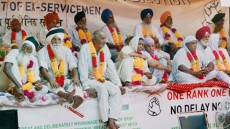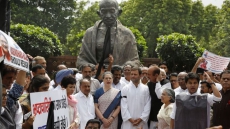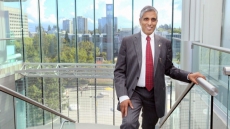A special court on Wednesday awarded the death penalty to five people and life in prison to seven others, all convicted for the July 11, 2006, serial blasts on Mumbai's suburban trains which killed 189 people, in one of the worst attacks on the city's crowded public transport system.
On September 11, Special Maharashtra Control of Organised Crime Act (MCOCA) Judge Y.D. Shinde found all the 12 people guilty of their role in serial blasts in the suburban trains, which also injured 817 commuters rushing home during the peak hours that rainy evening.
Those awarded the death penalty were Kamal A. Ansari, 37; Ehtesham K. Siddiqui, 30; Faisal Attaur Rehman Sheikh, 36; Asif Khan alias Junaid, 38; Naved Hussain Khan, 30.
The seven who were awarded life term in jail were medico Tanvir A. Ansari, 37; Mohammed Sajid Ansari, 34; Sheikh Mohammed Ali Alam Sheikh, 40; Mohammed Majid Shafi, 30; Muzammil Sheikh, 27; Soheil Mohammed Sheikh, 43; and Zamir Ahmed Sheikh, 36.
During the prolonged arguments of nearly three weeks on the quantum of sentence, Special Public Prosecutor Raja Thakre demanded death penalty for eight of the 12 convicts, terming them "merchants of death".
A teacher, Abdul Wahid Sheikh, was the lone accused who was acquitted in the case, while another prime accused, Azam Chima, alleged to be linked with the Lashkar-e-Taiba (LeT), is among the 17 who are missing and on the run. They include 13 Pakistani nationals.
Stunned by the punishment, relatives of the convicts who were awarded death sentence, said they would challenge the court verdict in the Bombay High Court.
Special Judge Shinde found that M. Faisal Attaur Rehman Shaikh, who was awarded death penalty, went to Pakistan twice for training.
He also sent youth to Pakistan for training, harboured Pakistanis at his home, and received money by the hawala route.
Similarly, Kamal A. Ansari was also trained in Pakistan, transported Pakistanis from the Nepal border to Mumbai, procured explosive material and planted the bomb which exploded in the suburban train at Matunga.
Naved Hussain Khan surveyed the trains, transported a bomb from Govandi to Bandra, planted one bomb on the train which exploded at Khar station.
Asif Khan alias Junaid procured the explosive material used to make the bomb, and planted one which exploded in the train at Borivali.
Ehtesham K. Siddiqui, the Maharashtra joint secretary of banned orgainsation SIMI, recced local trains, transported Pakistanis to Mumbra in Thane district, was present when the bombs were made at a house in Govandi, and planted the bomb which exploded in the train at Mira Road.
Five among the seven convicts awarded life sentence were trained in Pakistan, while Mohammed Majid Shafi helped transport Pakistanis from Bangladesh border to Mumbai and then back to Bangladesh after the terror blasts.
Mohammed Sajid Ansari provided the electrical circuits for the bombs which went off with precision at the intended targets that evening.
Earlier, during the arguments, Thakre had demanded death penalty for eight convicts -- Kamal A. Ansari, medico Tanvir A. Ansari, Mohammed Sajid Ansari, Sheikh Mohammed Ali Alam Sheikh, Mohammed Faisal Sheikh, Ehteshan Siddiqui, Asif Khan alias Junaid, and Naved Hussain Khan.
He sought life terms for Mohammed Majid Shafi, Muzammil Sheikh, Soheil Mohammed Sheikh, Zamir Ahmed Sheikh, arguing that they were guilty of offences which attract multiple life imprisonments, so they should be sentenced to life till the end of the lives in jail, or not less than 60 years.
Arguing for stringent punishment to all the convicts, Thakre said the evening peak hour timings chosen and the targets (packed suburban trains) on the Churchgate-Virar section showed their extreme mentality as it would inflict maximum casualties.
The trial continued for eight years in which the prosecution examined 192 witnesses, including policemen, civil servants, medicos, officials of various government departments, commuters, survivors and a person summoned as a court witness, with their deposition running into over 5,500 pages.
Starting at 6.23 p.m., the seven powerful RDX-laden bombs ripped off trains at Matunga Road, Mahim, Bandra, Khar Road, Jogeshwari, Borivali and Mira Road stations spanning Mumbai and Thane districts.
The explosions, using around 15-20 kg of RDX, were so powerful that they blew off the double-layered steel roofs and walls of the seven train compartments.
The Anti-Terrorism Squad had claimed that the suspects belong to Pakistan's Inter-Services Intelligence (ISI), LeT and the banned Students Islamic Movement of India (SIMI).
The trial started in June 2007, but was stayed in February 2008 after one of the 13 accused, Kamal Ansari, challenged the phrase 'promoting insurgency' in defining organised crime in the MCOCA as "unconstitutional".
In April 2010, the Supreme Court dismissed his petition, which paved the way for the trial to resume and complete this month.



